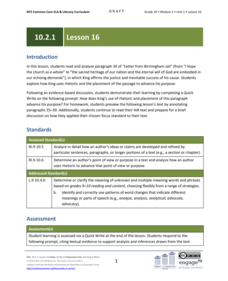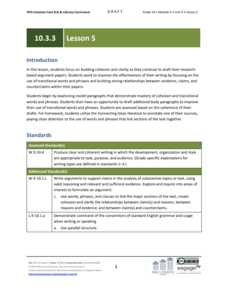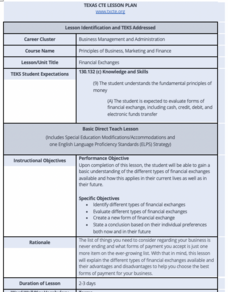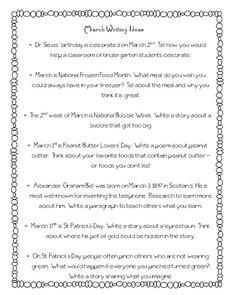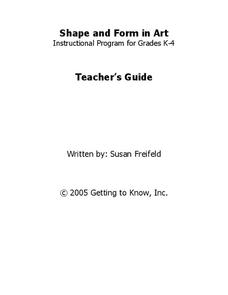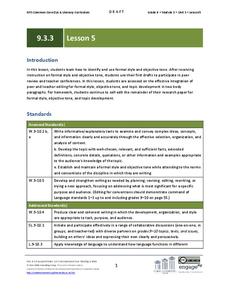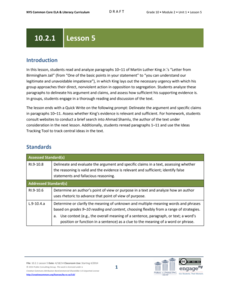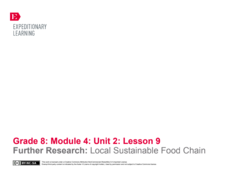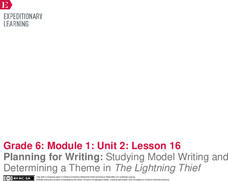EngageNY
Grade 10 ELA Module 2: Unit 1, Lesson 16
Take your place in the world—or the text. Scholars look at how the placement of a particular paragraph adds to the meaning of "Letter from Birmingham Jail" by Martin Luther King Jr. Before working on a quick write activity; readers...
EngageNY
Grade 10 ELA Module 3: Unit 3, Lesson 5
Can you please clarify? Scholars continue to work on their argumentative essays about selling human tissue by clarifying and adding cohesion. Writers begin by looking at model paragraphs and then begin improving their writing. They...
EngageNY
End of Unit 2 Assessment, Part 1b: Writing Introduction and Conclusion
Writers continue looking at the rubric for their A Long Walk to Water essays. This time, they analyze the demands for the introduction and conclusion paragraphs. Pupils compare the rubric to the opening and closing of the model...
EngageNY
Using Quotes and Opinion Writing: Ingenious Inventions by Women
Scholars complete multiple reads of Ingenious Inventions by Women: The Windshield Wiper and Paper Bag machine to determine gist, use quotes, define words, and form an opinion about the importance of the interventions. Learners work...
Curated OER
Vocabulary and Concept Development
Considering a lesson on Greek and Latin roots and affixes? The Latin roots bas and pos, and the Greek root bas are the focus on a colorful, animated presentation that will engage your learners and provide guided and independent practice...
University of Chicago
Comparing Modern and Ancient Ideas of Ethnicity and Identity
Explore ethnicity and identity with a research and writing assignment. Class members conduct online research, looking in particular at images and carefully noting down their sources on notecards. They read about identity and compose...
EngageNY
Grade 11 ELA Module 2: Unit 2, Lesson 5
Elizabeth Cady Stanton compares sins to monsters, using a metaphor to make a point about morality. Using the fifth of 14 lessons from the Grade 11 ELA Module 2: Unit 2 series, learners analyze paragraphs 8-10 of "An Address by Elizabeth...
EngageNY
Grade 11 ELA Module 2: Unit 1, Lesson 5
I have an idea! Scholars examine closely how Du Bois develops a central idea in paragraph four of the chapter "Of Our Spiritual Strivings." They also begin finding significant and relevant evidence to support a topic and complete...
EngageNY
Grade 10 ELA Module 2: Unit 1, Lesson 14
Let's see how the story unfolds. Scholars examine paragraphs of Martin Luther King Jr.'s "Letter from Birmingham Jail" to determine how King unfolds his analysis of the church. Before arriving at an answer, learners work in pairs and...
EngageNY
Grade 10 ELA Module 2: Unit 1, Lesson 18
Examine how Martin Luther King Jr.'s final paragraphs of "Letter from Birmingham Jail" summarize the ideas throughout the piece. Readers discuss word usage and new vocabulary and complete guided questions to better understand how the...
EngageNY
Whole Class Model Letter Writing: Organizing Reasons and Evidence and Using Transition Words
Where's the evidence? Scholars practice ordering the evidence and reasons for their class opinion papers by physically sorting them. Next, they work collaboratively to write a body paragraph, using linking words to connect their ideas...
Texas Education Agency (TEA)
Financial Exchanges
It's time to cash in some chips and learn about financial literacy. Using the informative resource, scholars identify and evaluate different types of financial exchanges. Pupils then develop a new form of financial exchange and create a...
Curriculum Corner
March Writing Ideas
So many things are happening in March, why not write about them? From Dr. Seuss' birthday to Peanut Butter Lover's Day to St. Patrick's Day, the prompts listed in the worksheet are sure to spark creative writing.
Student Handouts
Ten Things I Learned This Year
As you approach the end of the school year or New Years Eve, encourage reflection amongst your class members and gain a quick glimpse into the content and ideas that they remember the most.
Getting to Know
Shape and Form in Art
Introduce youngsters to the important role shape and form play in art with this extensive collection of activities and projects. From teaching first graders how to create mandalas to engaging third and fourth graders in the design...
EngageNY
Grade 10 ELA Module 1: Unit 2, Lesson 6
Is history "little more than a relic," as one of the characters in "The Palace Thief" contends? Has Hundert's love of antiquity kept him from changing with the times? Readers consider how the author uses these conflicting views to...
EngageNY
Grade 9 ELA Module 3, Unit 3, Lesson 5
Class members examine examples that model how to develop and maintain a formal style and an objective tone in informative/explanatory writing. They also engage in a peer review activity and revise their work based on the feedback.
EngageNY
Grade 10 ELA Module 2: Unit 1, Lesson 5
People should always choose their words carefully. Scholars examine the words used by Martin Luther King, Jr. in paragraphs 10 and 11 of his "Letter from Birmingham Jail." Readers answer questions about word use, think about synonyms,...
EngageNY
Grade 10 ELA Module 2: Unit 1, Lesson 15
Some things are worth doing again. Scholars take a look to see which ideas Martin Luther King Jr. revisits and refines in his "Letter from Birmingham Jail." To help with the process, readers answer guided questions, look at word...
EngageNY
Building Background Knowledge: The Desegregation of Schools and Brown v. Board of Education
Scholars gain interest in the case of Brown v. Board of Education by watching a video clip and completing a quick write. They then independently read excerpts from Brown v. Board of Education and work through a Steps for Getting the Gist...
EngageNY
Further Research: Local Sustainable Food Chain
Researchers review how to create citations, find reliable sources, and paraphrase. Next, using guided task cards and their researcher's notebooks, they investigate the question they developed in instructional activity eight about the...
EngageNY
Analyzing Textual Evidence: Working Conditions in the Mills
Deafening, dusty, debris. Such were the working conditions in the 1800s textile industry as portrayed in Katherine Paterson's novel Lyddie. Scholars watch a short video clip about life and work in the mills. Next, they work...
EngageNY
Planning for Writing: Studying Model Writing and Determining a Theme in The Lightning Thief
A theme runs through it. Scholars analyze how a common theme runs through the myths they have read and The Lightning Thief. They complete graphic organizers and view a four paragraph model essay. They analyze the essay for structure and...
EngageNY
Selecting Evidence: “The Hero’s Journey” and The Lightning Thief (Chapter 6)
Take a closer look. Scholars learn how to read closely using chapter six in The Lightning Thief. While reading, they write the gist of paragraphs on sticky notes and stick them in the book. They then answer text-dependent questions over...
